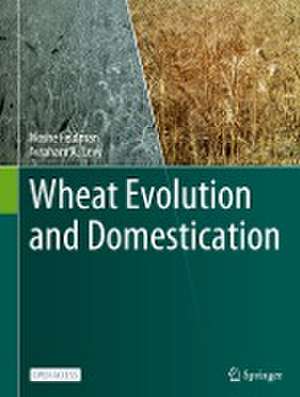Wheat Evolution and Domestication
Autor Moshe Feldman, Avraham A. Levyen Limba Engleză Hardback – 4 oct 2023
| Toate formatele și edițiile | Preț | Express |
|---|---|---|
| Paperback (1) | 402.86 lei 6-8 săpt. | |
| Springer International Publishing – 4 oct 2023 | 402.86 lei 6-8 săpt. | |
| Hardback (1) | 376.70 lei 3-5 săpt. | +87.90 lei 7-13 zile |
| Springer International Publishing – 4 oct 2023 | 376.70 lei 3-5 săpt. | +87.90 lei 7-13 zile |
Preț: 376.70 lei
Nou
Puncte Express: 565
Preț estimativ în valută:
72.09€ • 74.69$ • 60.16£
72.09€ • 74.69$ • 60.16£
Carte disponibilă
Livrare economică 01-15 martie
Livrare express 15-21 februarie pentru 97.89 lei
Preluare comenzi: 021 569.72.76
Specificații
ISBN-13: 9783031301742
ISBN-10: 3031301749
Pagini: 673
Ilustrații: XXIII, 673 p. 28 illus., 22 illus. in color.
Dimensiuni: 210 x 279 x 47 mm
Greutate: 1.88 kg
Ediția:1st ed. 2023
Editura: Springer International Publishing
Colecția Springer
Locul publicării:Cham, Switzerland
ISBN-10: 3031301749
Pagini: 673
Ilustrații: XXIII, 673 p. 28 illus., 22 illus. in color.
Dimensiuni: 210 x 279 x 47 mm
Greutate: 1.88 kg
Ediția:1st ed. 2023
Editura: Springer International Publishing
Colecția Springer
Locul publicării:Cham, Switzerland
Cuprins
1. Introduction.- 2. Taxonomy and Evolution of the tribe Triticeae Dumort.- 3. Genome structure of Triticeae species.- 4. B Chromosomes.- 5. Orphan genera of the subtribe Triticineae Simmonds.- 6. Secale L.- 7. Classification of the wheat group (the genera Amblyopyrum, Aegilops, and Triticum).- 8. Amblyopyrum (Jaub. &Spach) Eig.- 9. Aegilops L.- 10. Triticum L..- 11. Evolution of the diploid species of the sub-tribe Triticineae.- 12. Evolution of the allopolyploid species.- 13. Evolution of wheat under cultivation.- 14. Future prospects.- 15. References.
Notă biografică
Prof. Feldman’s research deals with cytogenetic, genomic, and evolutionary aspects of wheat and its wild relatives. His studies comprise mechanisms that increase genetic variability in species of the wheat group; nature of genes that control meiotic pairing in wheat and wheat hybrids; genetic and epigenetic changes that are induced by chromosome doubling facilitating successful establishment in nature of the newly-formed polyploids. Applied aspects of Feldman’s work contributed to development of methods for the exploitation of wild gene resources for wheat improvement. During his field research, Feldman discovered and described a new species of wild wheat and named it after his mentor, the innovative wheat geneticist Earnie Sears. Feldman served as head of the Plant Genetic Department and the Wheat Center of the Weizmann Institute of Science.
Prof. Levy’s research deals with the genetic and epigenetic mechanisms that are responsible for biodiversity and evolution in the plant kingdom. This includes research on hybridization and genome doubling, DNA recombination, DNA repair, transposable elements and genome stability. He is interested in utilizing these mechanisms to develop sustainable food production systems. He harnesses and develops advanced genetic manipulation technologies of genome editing to modify plant features in a precise manner through targeted mutagenesis, targeted recombination and gene targeting. Prof. Levy is a member of the Plant and environmental sciences department at the Weizmann Institute and served as dean of the Faculty of Biochemistry until the end of 2022
Prof. Levy’s research deals with the genetic and epigenetic mechanisms that are responsible for biodiversity and evolution in the plant kingdom. This includes research on hybridization and genome doubling, DNA recombination, DNA repair, transposable elements and genome stability. He is interested in utilizing these mechanisms to develop sustainable food production systems. He harnesses and develops advanced genetic manipulation technologies of genome editing to modify plant features in a precise manner through targeted mutagenesis, targeted recombination and gene targeting. Prof. Levy is a member of the Plant and environmental sciences department at the Weizmann Institute and served as dean of the Faculty of Biochemistry until the end of 2022
Textul de pe ultima copertă
This open access book covers a century of research on wheat genetics and evolution, starting with the discovery in 1918 of the accurate number of chromosomes in wheat. We re-evaluate classical studies that are pillars of the current knowledge in light of recent genomic data in the wheat group comprising 31 species from the genera Amblyopyrum, Aegilops, Triticum, and other more distant relatives. For these species, we describe morphology, ecogeographical distribution, phylogeny as well as cytogenetic and genomic features. For crops, we also address evolution under human selection, namely pre-domestication cultivation and domestication. We re-examine the genetic and archeological evidence of where, when, and how domestication occurred. Several species are polyploids, including bread wheat which is a young allohexaploid. We discuss unique aspects of genome evolution and maintenance under polyploidization. Finally, we propose some thoughts on the future prospects of wheat improvement. As such, it can be of great interest to wheat researchers and breeders as well as to plant scientists and students interested in plant genetics, evolution, domestication, and polyploidy.
Caracteristici
Compiles the information on wheat Useful reference to students, researchers, and breeders in wheat It is an open access book, which means that you have free and unlimited access
